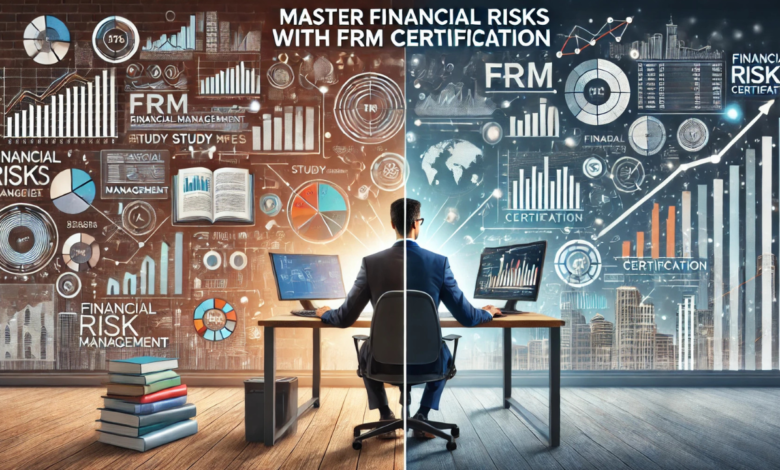Master Financial Risks with FRM Certification

With increasing competition, managing risk is now more needed. The Financial Risk Management certification is a one among few courses that focuses on risk management skills essential for today’s financially changing world. But what exactly is the FRM, who should consider pursuing it, and what can you expect in terms of career opportunities and salary?
The FRM certification is a world-wide accepted professional designation. This course trains individuals in various aspects of financial risk management, skilling them to assess, analyze, and lower down risks in a business. If you are looking for a career in finance, particularly in roles that deal with risk assessment and management, pursuing the FRM Course can be a changing point. FRM is going to be a great choice because of its skill-full syllabus, the practical experience it holds and because of its growing demand, you will be glad to know about how is the FRM course designed: –
The FRM Certification Exam Pattern
The FRM course consists of two levels of exams.
- Level I: This focuses on the foundational concepts of risk management, covering areas like quantitative analysis, financial markets, and risk measures.
- Level II: This delves deeper into advanced topics, emphasizing the application of risk management principles in real-world scenarios.
Each exam requires rigorous preparation, and candidates can take them at various locations around the world. Studying for the FRM exams is important, with many candidates dedicating several months to prepare, the best option is to study from the experts. Zell Education is a designated institute that provides preparation for FRM exams through its expert faculty. They have a full-fledged curriculum designed for FRM aspirants.
Who is Eligible for the FRM Course?
The most important requirement is a genuine interest in risk management and a commitment to studying. The course demands dedication and hard work, so a passion for finance is a good start. One of the great things about the pursuing FRMis that it welcomes a diverse range of candidates. Here are more details about FRM Course Eligibility criteria: –
- Educational Background: While a background in finance or commerce is beneficial, it’s not mandatory. Candidates who come from various other educational backgrounds, including economics, mathematics, engineering, and even social sciences are also welcomed by FRM certification, there are no restrictions
- Professional Experience: Though formal work experience isn’t mandatory to register for the exams, having some experience in finance or risk management can be advantageous in grasping the concepts more easily and later on it will help you build your resumes.
Why Do Companies Hire FRM Professionals?
With the world of finance becoming increasingly complex, companies are on the lookout for professionals who can navigate this uncertainty. Here are some key reasons why firms prioritize hiring FRM certified professionals:
- FRM professionals are trained to identify and manage risks effectively, which is crucial for protecting a company’s assets and ensuring long-term profitability.
- FRM professionals provide valuable ideas that aid in making informed financial decisions. Their expert knowledge gained from the FRM curriculum helps companies to grow in the heavy competition.
- Companies that employ FRM professionals often find themselves at an advantage over competitors. With a thorough understanding of both risks and opportunities, these firms can make more strategic moves in the market.
Career Opportunities in Financial Risk Management
Pursuing the FRM certification opens the door to a variety of exciting career opportunities. Here are some roles that FRM professionals commonly fill:
- Risk Analyst: These professionals evaluate the various risks that a company may face in current and future.
- Credit Risk Manager: This role involves assessing the risk of loss due to the failure of borrower to repay loans.
- Market Risk Manager: Market risk managers focus on understanding the risks that arise from changes in market prices and economic factors.
- Investment Risk Manager: These professionals study the investment made by a company to ensure they are in line with the what a company expects.
These roles are in demand across various sectors offering diverse opportunities for professionals.
What Salary Can You Expect?
The one more exciting aspect of the FRM certification is the salary it offers. FRM professionals earn higher salaries due to their invaluable knowledge in managing risk. Entry-level salaries often start around INR 5 Lakhs annually, while experienced FRMs can earn anywhere around INR 15 lakhs to INR 20 lakhs or more.
FRM Certification Will Be Big Step
With the increasing importance of risk management in today’s scenario, pursuing the FRM course can set you apart in the job market and lead to rewarding career opportunities. Whether you are just starting your career or looking to add-on your existing qualification, the FRM certification could be your ticket to a successful future in financial risk management. With its welcoming eligibility criteria and promising salary potential, it’s worth considering as your next big step!




